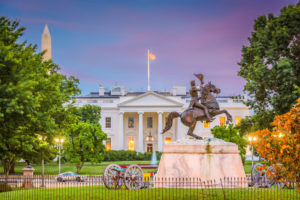
The Biden Administration proposes a regulatory scheme for private space flight, the FCC moves to protect domestic violence victims, and more…
IN THE NEWS
- The Biden Administration released a legislative proposal that would govern the regulation of private space flight. The Administration’s proposal would split regulatory authority between the Department of Commerce and the Federal Aviation Administration (FAA). Currently, the FAA’s regulatory authority is limited to the launch and reentry of spacecraft. The Administration’s proposal would allow the FAA to regulate manned and unmanned space missions beyond the atmosphere. In addition, the proposal would enable the Commerce Department to authorize new types of spacecraft and missions that are not already regulated by other agencies.
- In a 5-0 vote, the Federal Communications Commission (FCC) adopted rules to protect domestic violence survivors’ access to cellphones. The FCC will offer survivors low cost phone service through its Lifeline programfor six months after separating from an abuser. The rules will also require telecommunications companies to remove people from family billing plans upon request. FCC Chairwoman Jessica Rosenworcel noted that abusers use family plans as a “tool for control” to monitor family members’ calls and locations.
- The U.S. Department of Energy issued a proposed rule that would exempt certain energy storage, transmission, and solar energy projects from the requirements of the National Environmental Protection Act. The National Environmental Protection Act requires federal agencies to perform detailed studies into the environmental impacts of federal infrastructure projects before construction on the project may begin. The proposed rule would exempt projects that upgrade and rebuild existing power lines, install certain energy storage systems, and install solar panel systems. The Energy Department argued that the exemptions were justified “based on the experience of DOE and other Federal agencies, current technologies, regulatory requirements, and accepted industry practice.”
- The Biden Administration issued a memorandum and strategy document outlining the Administration’s policies to expand wireless spectrum capabilities across the United States in response to increasing demand for wireless technologies. Wireless spectrum is the range of radio waves through which electronic signals and messages are transmitted. Key priorities include studying existing spectrum bands to identify which federally-owned spectrum bands may be repurposed and encouraging private-sector innovation to expand broadband availability. The Administration stated that it seeks to ensure access to spectrum for “scientific, public safety, critical infrastructure, and national security uses.”
- The Texas State House of Representatives passed SB4, a bill that would make it a misdemeanor to cross from Mexico to Texas illegally. This move would empower law enforcement officers to arrest migrants and grant judges the authority to order migrants to leave the United States. If passed, the state could upgrade a charge to a felony if the migrant arrested is accused of other crimes or refuses a judge’s order to leave the country. During debates, state Democrats argued that the bill is intended to challenge Arizona v. U.S., a 2012 Supreme Court decision that prohibits local police from arresting people based only on immigration status. Republican Governor Greg Abbott is expected to sign the bill.
- The U.S. Environmental Protection Agency (EPA) proposed updates to its Safer Choice Standard, a label issued by EPA to products that meet energy efficiency and chemical safety requirements. The updates raise standards for ingredients used in sustainable packaging and pet care products. The revision would also create a certification awarded to cleaning service companies that follow best practices to protect workers exposed to cleaning products over long periods of time. EPA proposed excluding from eligibility companies that intentionally add microplastics, which can cause cancer, infertility, and immunodeficiencies, to packaging.
- The National Highway Traffic Safety Administration issued a final rule granting petitions for reconsideration of the “Bus Rollover Structural Integrity” standard. The standard includes measures to ensure that emergency doors do not open if the bus rolls over and also requires a “survival space” in the bus to protect riders if the structure of the bus collapses. In addition, the rule revises rollover testing standards to improve passenger safety and redefines “transit bus” to be any bus sold for public transportation in which passengers can request stops.
- The Animal and Plant Health Inspection Service (APHIS) issued a final rule declaring it safe to import fresh beef from Paraguay as long as certain conditions are met. Previously, fresh beef from Paraguay was subject to import restrictions to prevent the spread of animal-borne diseases. The final rule requires that fresh beef imported from Paraguay come from animals that were inspected by veterinarians for disease and are from a region that has been free from diseases, such as foot-and-mouth disease, for at least a year. APHIS reasoned that there is low risk of spreading animal-borne diseases if Paraguay complies with these standards.
WHAT WE’RE READING THIS WEEK
- In an article published in the Harvard Journal of Law and Gender, Allison Whelan, an assistant professor of law at Georgia State University College of Law, argued that the differences between state and federal pharmaceutical regulations contribute to reproductive health disparities. Whelan contended that marginalized individuals in states with limited reproductive choice are harmed because many do not have the means or ability to seek health care in other states. Whelan recommended that the U.S. Congress amend the Food, Drug, and Cosmetic Act to add a provision that would prohibit states from banning the use of medications approved by the Food and Drug Administration without going through an exemption process to justify the bans.
- The U.S. government’s Fifth National Climate Assessment reported that U.S. emissions are not declining fast enough to avoid a 1.5 degrees Celsius global temperature increase. The assessment focused on the growing consequences of climate change in the United States, including more severe wildfires, hurricanes, droughts, and heat waves. The report highlighted the economic cost of climate disasters, which have raised insurance rates and food prices. The report outlines how the government might adapt to a new climate, such as by imposing regulations on water-intensive industries during drought and directing new housing development away from flood-prone areas, rather than elevating homes above flood waters.
- In a recent paper, Francesco Trebbi, a professor at the Haas School of Business at the University of California, Berkeley, Miao Ben Zhang, a professor at the University of Southern California Marshall School of Business, and Michael Simkovic, a professor from the University of Southern California Gould School of Law, estimated that regulation costs U.S. businesses $289 billion annually. Furthermore, Trebbi, Zhang, and Simkovic argue that regulation has a disproportionate impact on medium-sized firms. According to Trebbi, Zhang, and Simkovic, large businesses can mitigate the impact of regulation by centralizing compliance and creating economies of scale while small firms are already exempted from the requirements of many important regulations.
EDITOR’S CHOICE
- In an essay in The Regulatory Review, Reeve T. Bull, the Deputy Director of the Virginia Office of Regulatory Management (ORM), argued that curbing overregulation is imperative to protect both businesses and the public. Bull highlighted the success of the regulation reduction scheme pursued by the ORM, which set a 25 percent regulation reduction goal for agencies in Virginia. The reductions are measured by the costs saved by an agency through limiting regulations. Bull explained that this approach lessened the harm enacted on businesses through regulation while still protecting the public.



